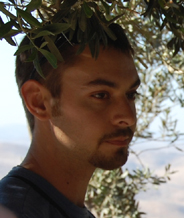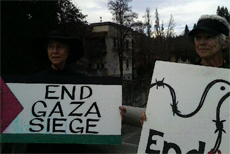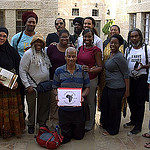|
|
< Report Three: A Day With The Olives (and other experiences) >
Trees of Peace: Olive Harvest
Delegation to Palestine/Israel
October 30, 2012
This delegation traveled concurrently with
the 2012 African Heritage Delegation > > >
We invite delegation participants to comment on and react to the experiences they have during our Israel/Palestine delegations in written Trip Reports.
Reports and Photos from IFPB's 42nd Delegation (Oct. - Nov. 2012):
Delegation 42 Announcement
Report 1: First Impressions
Report 2: Oases: Real, Imagined, and Impossible
Report 3: A Day With The Olives (and other experiences)
Report 4: Loving the Land and it's People
Report 5: Returning With Open Eyes
Individual delegates contribute pieces to these reports. As such, reports are not comprehensive accounts of every meeting or experience, but impressions of those things that most impact individuals. Submitted reports may be edited for clarity or brevity. Trip reports do not necessarily reflect the views of Interfaith Peace-Builders, trip leaders, or delegation partner organizations. We hope you enjoy reading and we encourage you to share these reports with others.
Signs of Hope
By George Meek
It was a heartening sign of hope to hear an Israeli peace advocate call for an end to violence by both Israelis and Palestinians. Julia Chaitin, a social psychologist born in the United States, has lived since 1973 in Urim Kibbutz in the Negev Desert, only eight miles from Gaza.
Since rockets from Gaza often explode near her kibbutz - 70 hit this week - and families are warned to stay in or near a safe room, Julia says "It drives you crazy; this is no way to live."
One might think she would call for massive retaliation. No way. She is in Other Voice, a grass roots group of people in Israel and Gaza who contact each other regularly, especially during the bombings, by phone, e-mail, and Facebook. The group just sent a letter urging the Prime Minister to "stop playing with our lives and begin talks with Hamas... We are tired of being sitting ducks in the firing range that serves political interests."
She says she became an activist because her parents instilled values of dignity, empathy, democracy, and social justice, and she realized that her government's policy does not meet those criteria.
Another sign of hope today. We drove past (but did not visit) the Oasis of Peace, a village of 50 families of Jews and Palestinian Arabs of Israeli citizenship living together in a community based on mutual acceptance, respect, and cooperation. Our guide Said told us that they had a hard time at the outset 35 years ago with criticism from their families, and the government did not give them access to electricity, water, and sewer for a long time because of its policy of discouraging co-existence. The Oasis of Peace has a web site (www.nswas.com) that tells about its School for Peace, Children's Education Program, and Pluralistic Spiritual Center. What a great example!
We saw the Erez Crossing, the only door to Israel for the 1.5 million Palestinians in the sealed prison called Gaza. Nobody came out while we were there, but the UN Office for Coordination of Humanitarian Affairs says on average 152 have been allowed to leave each day this year. Back in 2000, the daily average was 26,000! Since then, Israel has prohibited entry unless the Gaza residents meet its criteria for a special permit. Last month Israel's High Court ruled that Israel is not obligated to allow them to study in the West Bank, and may treat them as "enemy citizens" for purposes of passage. One member of our delegation, a U.S. citizen, recalls they "toyed" with her for 3 hours when she went through Erez to exit Gaza after a humanitarian mission two years ago. I think this is a tragic and disgraceful containment policy in the name of security.
This report is excerpted from George's blog. Read his full post at http://seekpeaceinpalestine.blogspot.com/2012/10/signs-of-hope.html
Visit to the Deheishah Refugee Camp
By Alexandra Lusak
Deheishah, located near Bethlehem in the occupied West Bank, is home to 12,000 people, many of them children. It was opened in 1949 by the UN Relief and Works Agency (UNRWA) to address the plight of Palestinian families from 46 villages who fled from their homes following attacks on them after imposition of the 1947-48 mandate. UNRWA rented the land for 99 years and initially put up tents. Residents – parents and/or grandparents of current residents – lived in tents from 1949 until 1967 at which point UNRWA erected shelters. From `49 to `67, there was no water or electricity. In 1967, concrete one-room multi-family shelters were shoddily built. Roofs leaked. Toilet facilities were communal. Waste ran in open ditches through the narrow streets.
Today housing is extremely cramped and is being built upward since no new building permits can be obtained. Children have no green space, play in the narrow streets, and have few, if any, healthy outlets for their energy. Overcrowded buildings, steep inclines, debris from demolished homes that may not be rebuilt, sky high unemployment, festering resentment, regular invasive incursions by the Israeli Defense Force, extraordinary restrictions on freedoms, and a strength of will, love of the land, and a proudly defiant spirit that refuses to be refused are some of what I saw and heard at Deheishah.
The injustice there is rampant and brutal. The story must be told.
Deheishah Refugee Camp - 24 Colors
By Wendy Hartley
The little boy, perhaps four years old, hung closely to his aunt's legs as she sat, speaking to our group of 32 Americans. We were in the unfinished charcoal gray cinderblock construction that is the extension being added to the Owdeh family living quarters.
Suheir is a vibrant, articulate, passionately caring Palestinian woman, small in stature and enormous in spirit. She answered questions. She told us that Palestinian women are unlike other women - they have to be so strong in every dimension to survive their life circumstances. When they are in labor and trying to get to a hospital to give birth, they can be held at a checkpoint by Israeli soldiers until they or the baby dies. If they do manage to give birth and both mother and baby live, the dangers to the child permeate the narrow, rubble and garbage strewn streets that are decorated by graffiti and murals of martyrs - history written on walls - that are the play spaces for kids. The overcrowded schools, the checkpoint crossings that they must endure to obtain work, or higher education, or health care, can all be malevolent and life-threatening. Suheir's intelligent, articulate 25 year old son, Murad, told us he has lost 11 friends to "death by occupation" already.
After the four year old had left the room, Suheir told us he has toy guns at home; he wants to kill all the Israeli soldiers. As we parted, I gave her a box of 24 crayons for the little boy. She smiled delightedly, thanking me and saying that he will like them for school. I hope he can think of things to draw other than guns and killing.
Building Bridges, Not Walls
By George Meek
"Building bridges is more important than building walls." That's what we heard today from the Rev. Samuel Barhoun, a Palestinian Israeli who is Arch Deacon of the Episcopal Diocese of Jerusalem and rector of the Holy Family Episcopal Church in Rene, a town near Nazareth in northern Israel. He told us about the Kids for Peace program, in which a dozen 12-year-olds (four Jews, four Christians, and four Muslims) meet weekly for a year in Rene, then go to the United States for a week together. A similar group in Jerusalem goes to Canada. The emphasis is on human rights and cultural activities. What a great program! May it be expanded and replicated.
Samuel's wife Susan, from Ramallah in the West Bank, is also a bridge builder, active in human rights issues. In fact, she completed the Building Bridges MBA program at Haifa University. She says that the 1.5 million Palestinians in Israel (20% of the country's population) face invisible walls of discrimination that must be broken down. She showed a video from the Adalah human rights group about discrimination in employment, education, land, housing, development, even marriage. Children are afraid their mothers will be deported under the amendment to the citizenship law that bars non-Israeli Arab spouses from living in the country. Susan told us, "my children are afraid to dream, but I want them to dream."
"We always dream," said Sima, a chemistry student at the new Nazareth Academic Institute who met with us in Nazareth. She said, "it's nice to have an Arab college here; it gives us confidence." The small college is now private, but charges low fees, and hopes to get funding from the central government agency. Most of the students are women.
Earlier today we met another bridge builder, Uruguay-born Dov Avital, a leader of the Metzer Kibbutz, which was started from scratch in 1973 by young Argentines. How I wish that all Israelis and Palestinians could adopt the model of cooperation developed between Metzer and its neighboring Palestinian village, Mesa. Dov says despite differences in ideology, language, and culture, the two communities miraculously decided to look at each other as human beings, not as stereotypes. They are united in a desire to build a better future for their children. They share water, which is such a bone of contention in this region. They also share roads and a sewer system. They go to visit each others' homes at times of joy and sadness, even after a terrorist killed five people in Metzer in 2002. Dov says that despite the gate that was put up after the attack, Mesa residents are still welcome in Metzer, and many come in every day to work or shop in the kibbutz. Unfortunately we did not visit Mesa to hear their story.
Dov says offers for closer ties with another Arab village on the other side of Metzer were rebuffed. He thinks it was a mistake to put the separation wall where it prevents them from getting to their fields or jobs. "If they cannot feed their children, they will fight," he says.
I had time after lunch to pray for peace in the magnificent Church of the Annunciation in Nazareth, and to thank God for the people who are building bridges instead of walls. It's true that flagrant human rights violations will persist until Israel ends the occupation and accepts the Palestinians' right of return , but as I see it, every little bridge helps.
This report is excerpted from George's blog. Read his full post at http://seekpeaceinpalestine.blogspot.com/2012/10/building-bridges-not-walls.html
Just a few days of intensity...
By Elissa Goss
Right now I am in Nazareth with our group and we are overlooking a valley where Jesus grew up and also where Mary was told by an angel that she was going to give birth the Divine. Talk about one hell of a check-up!
We talk about what we are seeing and hearing every day, all the time. My ability to understand what is happening is getting better but it is painful to hold all of this. Really, I shouldn’t say "but"....I should say "and" because I think too often we say "this oppression is happening and so forth BUT.." and we let our actions and others off the hook when we should be saying "and… this oppression is horrible, it’s painful to process AND we have stay committed". I say this because I don't have to live here every day and experience the occupation. I don't have soldiers shooting my friends and I all the time. I don't have restrictions on my movement, where I can live, who I can marry, what job I can have. I'm getting an education. Ability to grow food. I can fight for my dignity and the dignity of others without fear of losing my life.
So to feel some deep pain, confusion, and frustration at the occupation for a few days.... it's just a few days. It's crazy to think "oh this is so hard" because really, in comparison to the life-squelching fear and pain what Palestinians experience and feel every day, and the discomfort that Israeli’s feel, my discomfort right now cannot be a reason to disengage. Our discomfort can't be reason to disengage. There is joy in finding traction in tragedy and moving through it. Well, not joy exactly... but definitely a grounding sense of humanity. I feel truly alive because I'm recognizing my ability to be effective in this conflict and in others. . .
Here are a few of the experiences we’ve had recently which has informed my thoughts on this subject:
A couple days ago we met with Israeli Young Professionals and asked them some direct questions about the occupations, their reasons for supporting it, the reality of Israeli politics and how hard it is to influence their government (similar to our issue here in the States) and more about their experience in the military since it is required that every Israeli citizen serve 3 years, 18-21, in the military unless they are physically or mentally unable or Orthodox Jews.
Next day we walked around the west side of Jerusalem and noticed how different the municipal budgets were.... no trash, lightrail systems, flourishing businesses etc. Then we drove down south about 2 miles away from Gaza and met with a member of Kibbutz Urim who is part of the more radical Israeli left. It was very enlightening and more on that later cause I am running out of time to type this before we have to get on the bus.
Next day we met with another member of a different kibbutz, Kibbutz Metzer which was settled between two Palestinian communities but splits the two between the Green line so the Separation Wall separates the two communities from each other. This is also the kibbutz that experienced the murder of 5 of their residents by a Palestinian militant some years ago. The kibbutz member we met with has tried to work on creating an olive oil cooperative business in some sense between the two communities because now with the wall, there is an extremely high unemployment rate in the Palestinian town behind the wall but the Israeli government won't allow it. We had some really interesting talks with him about his experience and I wish we could have met with the members of the town.
Now we are in Nazareth and met with more human rights activists and learned about Palestinians and other Arab discrimination within Israel and some students from the Nazareth Academic Institute. . .
One way that I am finding to be effective is by connecting this to other issues around the world and especially, in the US. Privatization, movement restrictions, walls, fear, lack of education, healthcare, police brutality, the list goes on and we can find so many similar forms of the effects of settler colonialism in our own country that we need to address. I am really looking forward to returning to Olympia in the States and deepening connections of understanding between these manifestations in order to work together across issues and work on deconstructing the systems.
I am really feeling like we have to break apart what feeds and support these systems so that they can't manifest another conflict of oppressor and oppressed elsewhere right now or in the future. . .
This report is excerpted from Elissa's blog. Read the full post at http://actsofcommonhumanity.blogspot.com/2012/10/just-few-days-of-intensity.html
Olive Harvesting: A Family Affair
By George Meek
A couple days ago we enjoyed helping a Palestinian family harvest olives, sharing dinner with them and sleeping in their home. We also saw where the crop is processed and learned how it is sold.
To go to Jenin in the occupied territories (West Bank) from Nazareth in Israel, we had to pass through the Jalameh Checkpoint. It was the first time all week that we had to show our passports, but we were waved through. We saw a few pedestrians coming out through the facility that according to the sign was upgraded by USAID. By law Israelis are not allowed to enter Zone A, but Palestinian Israelis do (not Jewish Israelis).
In the village of Burqin near Jenin four members of our 32-member IFPB delegation joined Hatem Salamah, his brother Nasser, and several other members of their family to gather olives for about two hours. It was truly a family affair, with the men and boys beating the trees with poles while the women picked with their hands and the children helped gather olives from the tarps spread under the trees. The family harvests and prunes about 8 or 9 of its 80 trees in a single day. Unlike some other olive growers, they are not harassed by Israeli settlers damaging trees.
They deliver their olives for pressing and processing by Canaan Fair Trade, which has a state-of-the-art plant with Italian equipment right in their town. The family benefits from the Palestinian Fair Trade Association, which organizes cooperatives for 1500 small farmers to work collectively on organic quality, certification, and marketing in Europe and North America.
Nasser Abufarha, director of Canaan and founder of PFTA, told us that Israeli authorities arrested him this year for "organizing an illegal disturbance" at a fund-raising, awareness-building, tree-planting marathon. He says the olive farmers' main challenge is scarce and expensive water, because Israel refuses to grant permits for new wells in the West Bank, while Israeli farmers have cheap running water at all times. He adds that Israel's policy of creating a two-kilometer buffer zone around Israeli settlements in the West Bank, with many Palestinian olive trees in the zone, invites damage by settlers. Nasser says the farmers replace more trees than the settlers destroy, but they are hurt financially because it can take up to 15 years for the new trees to bear as much fruit. Export costs are higher because Israel forces the cargo to be offloaded from a Palestinian truck at the border crossing and transferred to an Israeli truck to go to the port.
Besides olive oil, the PFTA promotes exports of almonds and products made by women's cooperatives, such as couscous, sun-dried tomatoes, oregano, and soap. Click here to purchase these products!
We had a delightful experience of typical Palestinian hospitality by an extended family of about 25 persons at dinner tonight. The matriarch was Hatem's mother Nabiha, who is about 100 years old. Several of them spoke English, and we spoke a bit of Arabic, so we had a great time. They told us they love the American people, but wish our government would treat Palestinians better. We promised to do our best to spread the word.
This report is excerpted from George's blog. Read his full post at http://seekpeaceinpalestine.blogspot.com/2012/10/olive-harvesting-family-affair.html
GET OLIVE OIL AND OTHER FAIR TRADE PRODUCTS FROM PALESTINE!
Your purchase supports Palestinian Farmers and Interfaith Peace-Builders
A Look at Education
By Maya Harris
Let’s take a deeper look into the education system for Palestinians. In the first place, there are two educational systems; one for Palestinians and one for Jews. You can make a pretty good guess at who has easy access and a well funded education and who has to go through hoops and leaps just to get to school every day, let alone have money for a science class to do labs.
So with that already educational handicap on the Palestinians, there is a test all Israelis must take to go to college. This test is made with a Jewish mindset and values and translated into Arabic. With this the questions, a lot of the time, are not translated well and don’t make sense to a Palestinian. For awhile, the test would be too hard and Palestinians would fail. In result, they move to another place to get an education, meet someone then form a family and residency in a new area. First step to immigration.
Now, there are really good tutors to help the Palestinians pass this test. For West Bank Palestinians, they have to have permits to leave the West Bank and come into the ‘48 line of Israel just to get to tutors. Once they are denied, their education in Israel is basically squashed.
For the Israeli-Palestinians in Israel (inside the ‘48 line) who would like to become doctors or psychiatrists, they must be 21 years old to enter college. Since they graduate from high school at 18 and don’t enter the IDF, they are put on hold for 3 years. Since youth realize that education leads to transformation, they immigrate.
The reason why this is significant to the systematic oppression of the Palestinian people, is that at 18 years old, Israeli Jews enter the IDF for 3 years. So they come out the perfect age for college in Israel, right! The cherry on top of this delicious whip cream sundae is that if they defer out of the military, they are exempt of this age rule.
Israel justifies this unjust law by saying they “want mature students.”
So let’s say this hurdle is conquered and now a Palestinian is in a classroom setting with Jews for the very first time. And everything is in Hebrew. I hope you see the power dynamic in this situation. All this pressure makes their first year one of the most difficult and a lot of them drop out.
Now don’t get me started on the 2004 citizenship law that states that ANY Israeli citizen cannot marry anyone from the West Bank or of other Arab citizenship and reside with that person in Israel. Hmmmm. . . A law within Israel that applies to all of its citizens! This was originally a temporary annual law that had to be renewed but within the past year, is a permanent law ruled by the Supreme Court.
Information overload.
What I am ultimately trying to get across here is: Yes. Both sides are feeling the fear, violence and death of the occupation, but I am trying to display that one has power in this situation while the other is completely helpless. Having rockets land 10 kilometers away isn’t completely comfortable, but they chose where they wanted to live while the Palestinians are forced into the situation they are in. One has choice, privilege and options while others are met with road blocks, check points and a wall.
This report is excerpted from Maya's blog. Read the full post at http://jardingarden.tumblr.com/post/34472365765/lets-take-a-deeper-look-into-the-education-system
SUPPORT INTERFAITH PEACE-BUILDERS!
Nothing better prepares activists to work on the conflict than eyewitness experience. Your donation will further the education and engagement of new participants and build a larger, more diverse movement! Click here to donate online!
TRAVEL TO ISRAEL/PALESTINE WITH INTERFAITH PEACE-BUILDERS!
Your participation as an eyewitness will enrich your understanding of the conflict and empower your work back in the United States! Click here for information on upcoming delegations.
| Select a report to view: | Announcement | 1 | 2 | 3 | 4 | 5 | ACTION |



 MUST READ: STATEMENT
MUST READ: STATEMENT  BUY FAIR TRADE OLIVE OIL & MORE - DIRECT FROM PALESTINE!
BUY FAIR TRADE OLIVE OIL & MORE - DIRECT FROM PALESTINE! 
